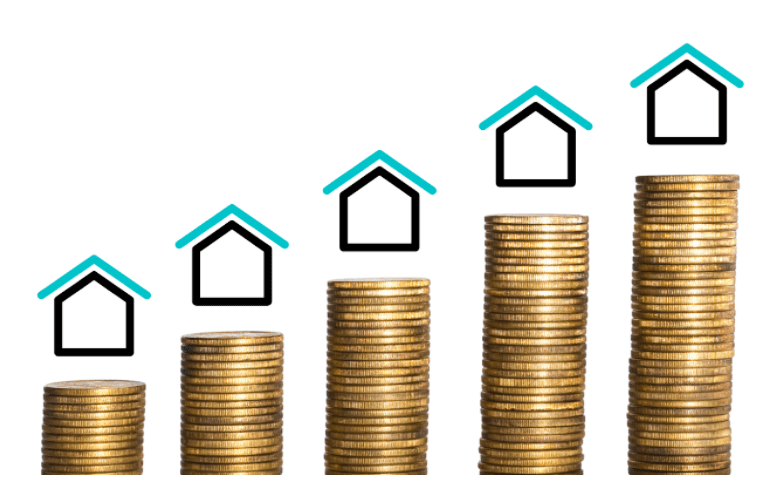Most people have a broad understanding of inflation. Yes, we all know it increases the price of a pint of milk or a loaf of bread, but in reality, inflation affects a lot more than just your grocery bill.
With a surge in inflation disrupting the global economy, as a prudent investor, you’re probably wondering what this means for your investments in property. Inflation is indeed a major cause for concern as it affects all areas of the economy, and this naturally includes investments. So what exactly is it? And how does it impact real estate investments?
But, before you start tweaking your investment portfolio, let us deflate your inflation worries by explaining this sticky situation a little better.
What is inflation?
Inflation is one of the many indicators used to monitor the economy’s health. In plain terms, inflation is an increase in the average price level across all services and products in an economy over a period of time.
So, this increase in prices means that for every unit of currency spent, fewer goods and/or services can be purchased, meaning today’s dirham won’t get you the same thing tomorrow, which is essentially a loss of purchasing power of money.
For example, let’s suppose you buy an iced coffee for AED 20, and the yearly inflation rate is 10%. Theoretically speaking, that 10% inflation means your iced coffee would cost 10% more next year, increasing to AED 22. The same theory applies to real estate. Given your income doesn’t increase by at least the same rate of inflation, then you won’t be able to afford as many iced coffees the following year.
This decrease in purchasing power invariably impacts the demand and supply of such goods/services. Usually, in a typical growing economy, the demand outpaces the supply of goods resulting in sellers raising their prices, thus leading to inflation.
Inflation is measured by tracking the speed at which the prices of a basket of goods increase in a given period of time. In the UAE, the Federal Competitiveness and Statistics Authority (FCSA) collects around 334 different categories of services and goods and calculates the cost of this bucket to arrive at the Consumer Price Index (CPI).
What are the causes of inflation?
Inflation can be caused by many factors, including global pandemics, shortages of raw materials, energy-supply concerns, and so on. Over the past couple of years, however, governments worldwide resorted to stimulating the economy by spending and injecting money into the financial system throughout the pandemic, putting upward pressure on suppliers, already facing supply chain disruptions – who couldn’t keep up with the demand. Businesses consequently raised their prices as there was either an imbalance in supply or because improving their profits without losing customers was on the cards – resulting in inflation. In the UAE’s case, for instance, the inflation rate grew to 2.58% in November 2021, from 1.86% the previous month.
How does inflation impact real estate?
When investing in Dubai property, it’s important to consider the effect of key economic indicators, like inflation. While inflation influences the cost of goods and services, it also directly affects real estate across all property types, from the cost of building new properties to the cost of financing real estate deals.
1. Increase in cost of materials
Because prices increase with inflation, the cost of construction materials also rises. The construction of a building involves a wide range of materials like steel, wood, copper, glass, concrete, and so on – all of which increase in an inflationary environment.
Not only that but machinery costs and labor are usually available at higher rates. This means that the construction companies need to spend more to build, say, an apartment complex. In order to compensate for the additional costs, the developer then increases the sale price of the house.
Therefore, inflation makes new houses more expensive, reducing the supply of new constructions. This invariably leads to an increase in the price of existing houses as the demand inevitably increases.
2. Costlier loans
Another setback of inflation is that commercial banks start increasing their interest rates. This is because inflation corrodes the value of money, hence lenders increase the interest rates to make up for their loss and fight off inflation.
This is bad news for borrowers, as they’re expected to pay more interest on their housing loans/mortgages. Along with the increase in property prices, potential buyers also become skeptical about purchasing new properties. This reluctance, as a result of higher interest rates, leads to people hoarding their money more into their savings, which isn’t the best idea either during inflation as the value of money weakens.
Additionally, there are many developers who rely on bank finance for the completion of their projects. With loan rates increasing, they experience an overall increase in the cost of construction and end up increasing the price of the ready units to cover up for their losses.
3. Rentals increase
Since the cost of borrowing increases, people tend to rent a property rather than buy one.
Also, landlords seize this opportunity to raise prices and increase the rent to compensate for the rate of inflation. Since the demand is higher, with many people steering clear of purchasing property in rising inflation, tenants are willing to pay a little extra rent rather than bear the cost of an expensive mortgage.
How can real estate investments protect you against inflation?
Although some may firmly believe in crypto being an effective hedge against inflation, whether you like it or not, cryptocurrencies are extremely volatile, which is pretty evident in the market crash happening right now. The price of bitcoin significantly dropped from an all-time high of $68,000 to $38,000 now. This proves once again that real assets, like commodities or real estate, tend to have stronger resistance to inflation. The value of these assets remains, as opposed to just holding onto the money, given that the purchasing power erodes over time.
What sets real estate investments apart from other assets is that they provide more steady passive income returns and capital appreciation from the assets. Not only that, investing in real estate has the potential to build generational wealth via multiple income streams with minimal risk during an inflationary period.
Also, in areas with limited supply, there’s a higher demand for rental units in those markets, contributing to the appreciation of prices for real estate. As long as the price increases are higher than the inflation rate, then investors should expect good returns, particularly when investing in Dubai.
Furthermore, during inflation, the prices of all products and services increase, including the prices of properties. Therefore, once you buy a house on a mortgage at a fixed rate of interest, you actually pay less each year, since the money devalues with inflation. Also, the price of your property increases, making it a win-win situation for you.

In a nutshell
As the demand and prices of consumer products or services increase during inflation, real estate assets follow suit. The rising cost of materials, higher interest rates, and a greater number of rentals are some of the main effects of inflation in relation to the real estate market.
But with more positives than drawbacks, high inflation has traditionally worked to a long-term real estate investor’s advantage as the value of their property increases over time. Throughout an inflationary period, landlords are also able to increase their asking prices, as there’s a higher demand for rental properties.
However, during such market upsets, many investors remain unsure of whether they should make changes to their portfolios when investing in Dubai. While this isn’t always necessary, as a little perspective can definitely go a long way. Yes, real estate can help shield against inflation, but only to a certain degree. For example, purchasing a property in a remote area with no nearby amenities will certainly become a liability instead of an asset, especially if it remains unoccupied with accumulating upkeep costs.
This is why your best bet is to have a thoughtful approach and diversify your portfolio to help you maximize your returns, as well as reduce your exposure to various risks associated with whichever asset. This holds true to investments like crypto assets, which may help hedge against inflation, yet they’re known to carry more risk.
Even if you do not have the cash to buy into an investment property, you can invest small amounts via crowdfunding platforms, like SmartCrowd, which gives you access to Dubai’s prime real estate. So why put all your money in one property when you can split it across multiple properties? In other words, don’t put your eggs in one basket! This type of fractional ownership allows you to mitigate risk and diversify your portfolio with many rental property options to choose from based on your investment needs.
As with any big investment decision, it’s important to keep your guard up for all risks. However, careful planning, awareness of the current economic conditions, and seeking advice from a financial advisor can keep your money safe.






